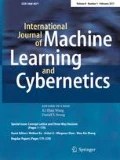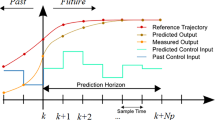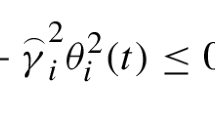Abstract
In this paper, the nonlinear multi-agent system which contains uncertainty and is controlled by state-constraint impulsive protocol is taken into consideration. For the uncertainty of the multi-agent system, it is replaced by fuzzy logic system approximately and a judgement strategy which only contains the relative information with neighbors is proposed in this paper. In order to do research in state-constraint impulsive protocol, three kinds of impulsive control protocols which conclude partial input saturation, double actuator saturation and single actuator saturation are discussed. Then, some sufficient conditions of the system are obtained to reach consensus. Finally, some numerical simulation examples are provided to prove the effectiveness of the theoretical analysis.









Similar content being viewed by others
References
Zhu Y, Li S, Ma J, Zheng Y (2018) Bipartite consensus in networks of agents with antagonistic interactions and quantization. IEEE Trans Circuits Syst II Express Briefs 65(12):2012–2016
Ma J, Ye M, Zheng Y, Zhu Y (2019) Analysis of hybrid multi-agent systems: a game-theoretic approach. Int J Robust Nonlinear Control 29(6):1840–1853
Han Y, Li C, Zhang W, Ahmad H (2018) Impulsive consensus of multiagent systems with limited bandwidth based on encoding–decoding. IEEE Trans Cybern. https://doi.org/10.1109/TCYB.2018.2863108
Xu Z, Li C, Han Y (2019) Leader-following fixed-time quantized consensus of multi-agent systems via impulsive control. J Frankl Inst 356(1):441–456
Liu C, Tian Y (2019) Formation control of multi-agent systems with heterogeneous communication delays. Int J Syst Sci 40(7):627–636
Guan Z, Wu Y (2012) Consensus analysis based on impulsive systems in multiagent networks. IEEE Trans Circuits Syst I 59(1):170–178
Olfati-Saber R, Murray R (2004) Consensus problems in networks of agents with switching topology and time-delays. IEEE Trans Autom Control 49(9):1520–1533
Olfati-Saber R, Fax J, Murray R (2007) Consensus and cooperation in networked multi-agent systems. Proc IEEE 95(1):215–233
Ma T, Zhang Z (2018) Adaptive consensus of multi-agent systems via odd impulsive control. Neurocomputing 321:139–145
Hong Y, Hu J, Gao L (2006) Tracking control for multi-agent consensus with an active leader and variable topology. Automatica 42(7):1177–1182
Han Y, Li C (2018) Second-order consensus of discrete-time multi-agent systems in directed networks with nonlinear dynamics via impulsive protocols. Neurocomputing 286:51–57
Wen G, Chen P, Liu C, Liu Y (2015) Neural-network-based adaptive leader-following consensus control for second-order non-linear multi-agent systems. IET Control Theory Appl 9(13):1927–1934
Mei J, Ren W (2016) Distributed consensus of second-order multi-agent systems with heterogeneous unknown inertias and control gains under a directed graph. IEEE Trans Autom Control 61(8):2019–2034
Zheng Y, Ma J, Wang L (2018) Consensus of hybrid multi-agent systems. IEEE Trans Neural Netw Learn Syst 9(4):1359–1365
Feng Y, Li C (2017) Sandwich control systems with impulse time windows. Int J Mach Learn Cybern 8(6):2009–2015
Zhu X, Guo H, Yun X (2011) Theory and application of impulsive differential equations, vol 32. Science Press, Tokyo, pp 1253–1264
Li C, Zhou Y, Wang H (2017) Stability of nonlinear systems with variable-time impulses: B-equivalence method. Int J Control Autom Syst 15(5):2072–2079
Ma F, Li C, Huang T (2011) Iterative learning control design of nonlinear multiple time-delay systems. Appl Math Comput 218(8):4333–4340
Zhou J, Xiang L, Liu Z (2007) Synchronization in complex delayed dynamical networks with impulsive effects. Physica A 384(2):684–692
Li L, Li C, Li H (2018) An analysis and design for time-varying structures dynamical networks via state constraint impulsive control. Int J Control 5(1):1–23
Jiang X, Zhan X, Guan Z, Zhang X, Li Y (2015) Neimark–Sacker bifurcation analysis on a numerical discretization of Gause-type predator–prey model with delay. J Frankl Inst 352(1):1–15
Sun Y (2012) Average consensus in networks of dynamic agents with uncertain topologies and time-varying delays. J Frankl Inst 349(3):1061–1073
Zhan X, Guan Z, Yuan F (2013) Optimal tracking performance and design of networked control systems with packet dropout. J Frankl Inst 350(10):3205–3216
Jiang X, Guan Z, Zhang X (2017) Performance limitations of networked control systems with quantization and packet dropouts. ISA Trans 10(8):98–106
He X, Li C, Pan X (2014) Impulsive control and Hopf bifurcation of a three-dimensional chaotic system. J Vib Control 20(9):1361–1368
Li D, Wang Z, Zhou J (2008) A note on chaotic synchronization of time-delay secure communication systems. Chaos Solitons Fractals 38(4):1217–1224
Zhang Q, Zhao J (2012) Projective and lag synchronization between general complex networks via impulsive control. Nonlinear Dyn 67(4):2519–2525
Guan Z, Zhang H (2008) Stabilization of complex network with hybrid impulsive and switching control. Chaos Solitons Fractals 37(13):1372–1382
Ling G, Guan Z, Chen J, Lai Q (2019) Chaotifying stable linear complex networks via single pinning impulsive strategy. Int J Bifurc Chaos 29(02):1950024
Liu N, Fang J, Deng WuZ, Ding G (2018) Synchronization for a class of fractional-order linear complex networks via impulsive control. Int J Control Autom Syst 16(6):2839–2844
Ren C, Chen L, Chen P (2016) Adaptive fuzzy leader-following consensus control for stochastic multiagent systems with heterogeneous nonlinear. IEEE Trans Fuzzy Syst 25(1):181–190
Yang S, Li C, Huang T, Zhang W (2019) Fixed-time consensus of complex dynamical networks with nonlinear coupling and fuzzy state-dependent uncertainties. Fuzzy Sets Syst 365:81–97
Acknowledgements
This work was supported by National Natural Science Foundation of China (61873213, 61633011), and in part by National Key Research and Development Project (2018AAA0100101).
Author information
Authors and Affiliations
Corresponding author
Additional information
Publisher's Note
Springer Nature remains neutral with regard to jurisdictional claims in published maps and institutional affiliations.
Rights and permissions
About this article
Cite this article
You, L., Li, C. & Han, Y. Consensus of nonlinear multi-agent systems with fuzzy modelling uncertainties via state-constraint hybrid impulsive protocols. Int. J. Mach. Learn. & Cyber. 11, 2653–2664 (2020). https://doi.org/10.1007/s13042-020-01140-4
Received:
Accepted:
Published:
Issue Date:
DOI: https://doi.org/10.1007/s13042-020-01140-4




